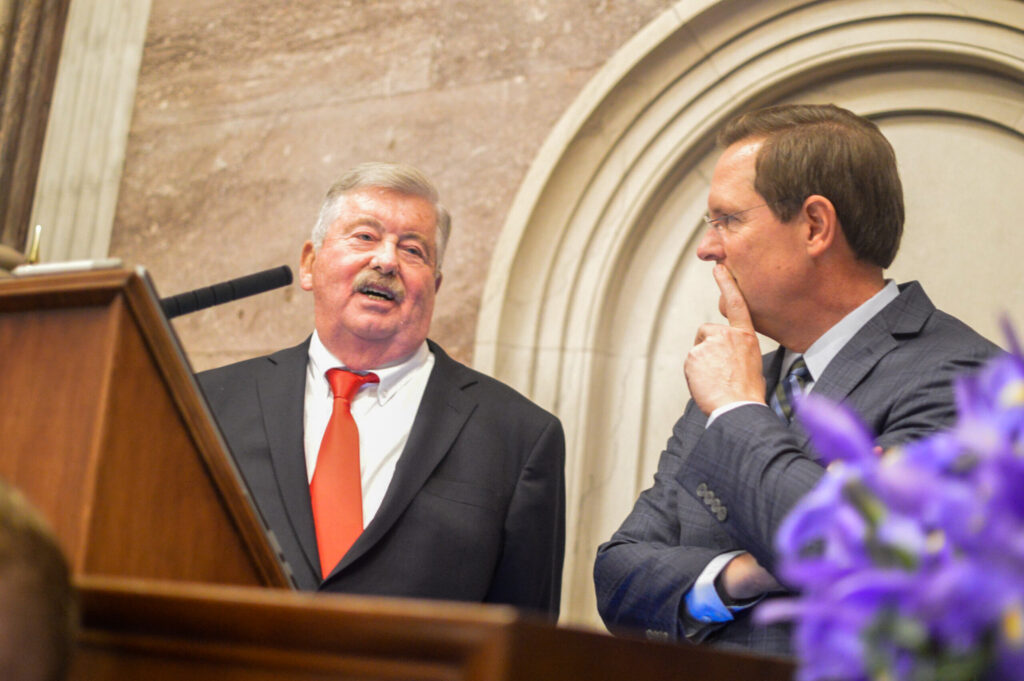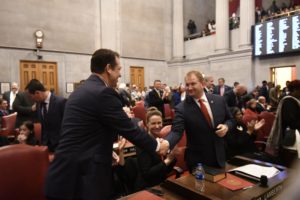
Republicans in the Tennessee General Assembly seem to have it out for Davidson County this session. They’ve introduced several bills that would hand over power of local boards to the state, make it harder for Nashville to pay for their convention center, and slice the size of the Metro Council in half.
Rep. William Lamberth, R-Portland, is behind one of the bills that’s grabbed the most attention this session, capping the size of metro government. He says at 40 members it’s too large.
 Anna Katherine White Tennessee House Majority Caucus
Anna Katherine White Tennessee House Majority CaucusHouse Republican Leader William Lamberth (right) shakes hands with Republican Caucus Chairman Jeremy Faison (left). Lamberth is behind the bill that would slice the size of the Metro Nashville Council in half.
“In essence, once a city government goes beyond a certain size, it stops being effective for the citizens that they represent and, quite frankly, becomes almost impossible for other entities to work with them,” said Lamberth.
Lamberth wants to limit the size to 20 members. But Rep. Harold Love Jr., D-Nashville, says doing that goes against the purpose behind having a larger council.
“They knew that if the city and county consolidated, naturally, there’d be a loss of Black representation on the city council,” said Love.
Love’s father was one of only three Black members to serve on the Nashville City Council in 1961. Harold Love Sr. was part of the merger of city and county government that took place in 1963. His son now worries downsizing the council could erase the progress minorities have made.
“If we go back to a size even below the ’61 level, then we might see a diminishing of the opportunities for representation that had not been seen since the ’60s,” said Love.

Delishia Porterfield worries about councilmembers’ responsiveness to their constituents if they are representing twice as many in a halved Metro Council.
Councilmember Delishia Porterfield says it’s not just diversity that could suffer. She says having 40 members allows them to be responsive to their constituents.
“The local elected officials, we are the people that are closest to our constituents,” Porterfield said. “We go to the same grocery stores. We go to the same parks. The people in our community know us, and we represent their interests.”
Currently, each member serves a little more than 20,000 constituents. If Lamberth’s bill passes, that number would nearly double.
He says the reason behind the change is to make the council more effective, but Councilmember Tanaka Vercher is skeptical.
“It’s all stemming from a vote as it relates to the council — well, some on the council — rejecting the RNC coming to Nashville,” Vercher said.
In July, Metro Council shot down a proposal that would’ve welcomed the 2024 Republican National Convention, citing security concerns. A month later, the RNC chose Milwaukee instead.
Reaction was immediate. House Speaker Cameron Sexton, R-Crossville, criticized Nashville and now backs Lamberth’s bill.
“We just want to make sure that we don’t get progressiveness in these cities that will limit business wanting to come to our state,” said Sexton.
Rep. Vincent Dixie, D-Nashville, says Republican leadership isn’t stopping there.
“I want to make sure that people understand this is the beginning of a slippery slope,” Dixie said. “There’s more bills that will be targeted at Davidson County as far as our sports authority, our convention center, the airport authority.”
All of these are tied to bills that are now working their way through the committee process. The two dealing with the sports and airport authority would let the governor and General Assembly appoint most of the members to these boards.
Sexton defended the decision to reporters last week, saying the state is funneling millions of dollars to support Metro.
“The airport is a regional airport now. It really is,” Sexton said. “The amount of people coming in from outside of Nashville is more than the inside being used.”
Sen. Charlane Oliver, D-Nashville, says the city’s voters shouldn’t be punished for holding different views.
“Nashville wants to be a partner to the state, not a punching bag,” Oliver said.
None of the bills targeting Davidson County have passed both chambers yet.
Lamberth’s bill to downsize the council is scheduled for a hearing this week. Lawyers for Metro Council have warned that, if it becomes law, they are prepared to fight the state in court.

